| Warning: If you modify the imported IDL file, do this only in the XML Mapping Editor to ensure the correct dependencies between the IDL and the related XMM file. |
Start the IDL Extractor for XML Schema as any other eclipse New wizard:
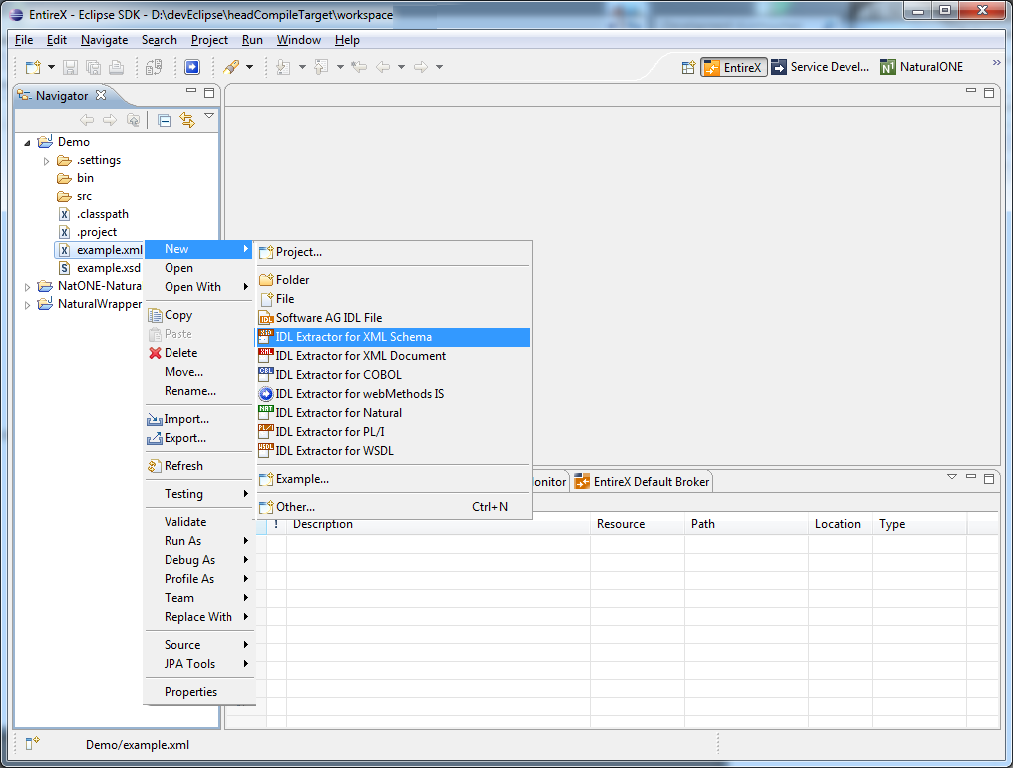
Depending on the location of the XML Schema to analyze, choose File or URL:
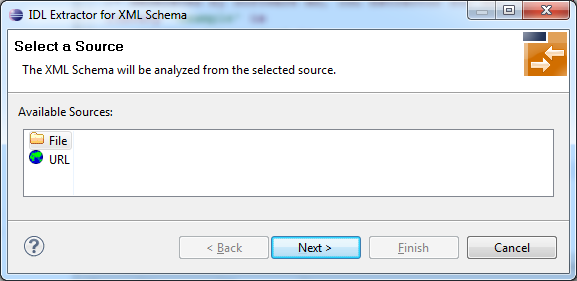
File
If the XML Schema source file to be extracted is available in your workspace
and you have selected it, the file location will be entered in the wizard automatically
in the next Step 3a: Specify XML File.
Note:
Nested imports for XML Schema should be addressed in the same way as the base document.
If those nested imports are addressed relatively, all of the documents must be in your file system.
URL
Continue with Step 3b: Specify XML File URL.
Notes:
http://host/myservice?XSD
Define trustStore in Designer,
for example with the following lines in file eclipse.ini
-Djavax.net.ssl.trustStore=<path to keystore> -Djavax.net.ssl.trustStorePassword=<keystore password>
If hostname verification for certification is to be disabled, also add the line:
-Dcom.softwareag.entirex.ssl.hostnameverify=false
If you selected the XML Schema source file before you started the wizard, the file location is already present. Enter or browse for the XML Schema source file. Continue with Step 4: Specify Output Files.
For the direction OUT - that is, the reply from the server - an optional XML Schema file can be specified to extract the parameters of the interface.
If no additional XML Schema file is given, parameters for direction IN and
OUT are the same and extracted from the same input XML Schema file. The resulting Software AG IDL File contains all the parameters of the interface
as IDL parameters (see parameter-data-definition)
with its direction (see attribute-list).
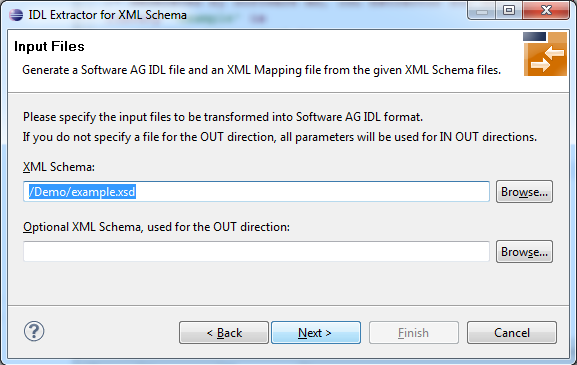
Enter the URL for the XML Schema source file. You can specify an optional XML Schema file for the IDL direction OUT.
See Step 3a: Specify XML File for more information.
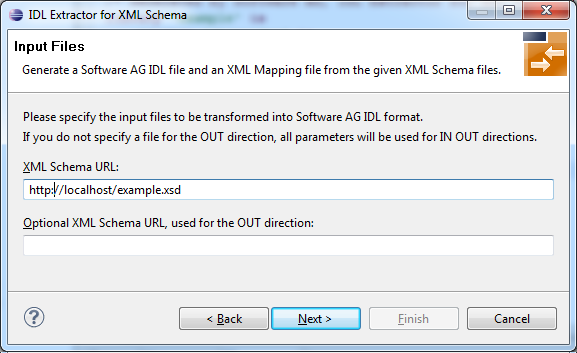
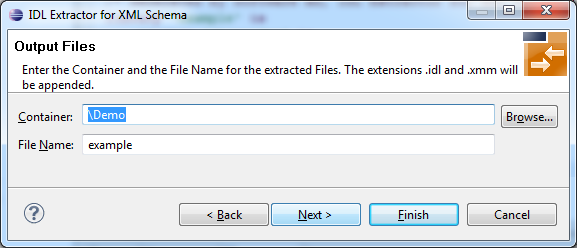
Select the Container where the IDL file will be stored. Enter the name of the new IDL file and the related XML mapping file.
The Options for Target Programming Language page allows you to specify transformation rules for variable-length fields and unbounded arrays. This is required if you later use the COBOL Wrapper or PL/I Wrapper with the extracted IDL – otherwise COBOL or PL/I wrapping is not possible. If you later use the Natural Wrapper, transformation rules are optional. If they are used, the interface from a Natural point of view is more legacy-like, easier to use but with restrictions.
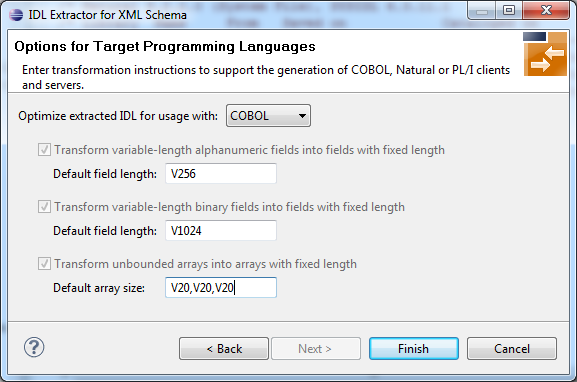
With the transformation rules, you define default (maximum) lengths and sizes depending on the originating data types on the XML side. If you need different (maximum) lengths and sizes for fields with the same data type, use the XML Mapping Editor. See Using the XML Mapping Editor
| Warning: If you modify the imported IDL file, do this only in the XML Mapping Editor to ensure the correct dependencies between the IDL and the related XMM file. |
Depending on the target programming language of your scenario, the available/possible transformation rules differ. Use the combo-box and choose the target programming language:
For generation of clients and servers with the COBOL Wrapper.
Variable-length fields and unbounded arrays with unlimited number of elements are not directly supported by COBOL. There are two possibilities to specify options:
Transform to Fixed-length COBOL Fields and Tables
Variable-length fields on the XML side are mapped to fixed-length COBOL data items, that is,
they will always be padded (alphanumeric with trailing blanks; binary with x00).
Unbounded arrays on the XML side are mapped to fixed-size COBOL tables, see Tables with Fixed Size under COBOL to IDL Mapping in the IDL Extractor for COBOL documentation.
This means they will always be filled up to the maximum number of elements.
To use this possibility, enter the length or size to define the restriction, for example 256, 1024 or 20.
Limit Variable-length Fields and Unbounded Arrays to a Maximum
For variable-length fields, EntireX provides a possibility to transform them into variable-length fields
with a maximum length. See IDL Data Types, AVnumber and BVnumber under column Type and Length.
In this case the variable-length fields are also mapped to fixed-length COBOL data items, but they will be trimmed
(alphanumeric with blank, binary with x00) on the COBOL side.
Unbounded arrays with a maximum are directly supported in COBOL in the form of COBOL tables with the OCCURS DEPENDING on clause,
see Tables with Variable Size - DEPENDING ON Clause.
Only filled elements are transferred.
In this case the RPC message size is reduced compared with the alternative Transform to Fixed-length COBOL Fields and Tables above.
To use this possibility, enter a leading V-character before the limited length or limited size of unbounded arrays,
such as V256, V1024 or V20.
For generation of clients and servers with the Natural Wrapper.
Variable-length fields and unbounded arrays with unlimited number of elements are directly supported by Natural. As an alternative, EntireX also provides the possibility to transform to a more legacy-like interface with fixed length.
Transform to Fixed-length Fields and Fixed-size Arrays on the Natural Side
Variable-length fields on the XML side are mapped to fixed-length Natural data types, that is,
they will always be padded (alphanumeric with trailing blanks; binary with x00).
Unbounded arrays on the XML side are mapped to fixed-length Natural arrays, that is,
they will always be filled up to the maximum number of elements.
Using this possibility you benefit from easier and simpler Natural programming.
To use this possibility, check the check boxes and enter the restricted length for variable-length alphanumeric fields,
such as 253, variable-length binary fields such as 126, and the restricted size, for example 20,20,20 for unbounded arrays.
Transform to Variable-length Fields and Variable-size Arrays on the Natural Side
Variable-length fields on the XML side are mapped to Natural DYNAMIC data types.
No padding occurs on the Natural side. Unbounded arrays on the XML side are mapped to Natural X-Arrays.
Only filled elements are transferred.
In this case the RPC message size is reduced compared with the alternative
Transform to Fixed-length Fields and Fixed-size Arrays on the Natural Side above.
To use this possibility, uncheck the check boxes.
For generation of clients with the PL/I Wrapper. The following possibilities exist in scenarios with PL/I clients:
Transform to Fixed-length Fields and Arrays
Variable-length fields on the XML side are mapped to fixed-length PL/I data items,
that is, they will always be padded (alphanumeric with trailing blanks; binary with x00).
Unbounded arrays on the XML side are mapped to fixed-size PL/I arrays,
see Arrays under PL/I to IDL Mapping.
This means they will always be filled up to the maximum number of elements.
To use this possibility, enter the length or size to define the restriction, for example 256, 1024 or 20.
Limit Variable-length Fields to a Maximum
As an alternative, variable-length fields can be mapped to PL/I data type with the attribute VARYING.
See also IDL Data Types AVnumber and BVnumber under column Type and Length.
In this case no padding occurs on the PL/I side. To use this possibility,
enter a leading V-character before the limited length, such as V256 or V1024.
Note:
This alternative does not exist for unbounded arrays.
For generation of servers with the PL/I Wrapper. The following possibilities exist in scenarios with PL/I servers:
Transform to Fixed-length Fields and Arrays
Variable-length fields on the XML side are mapped to fixed-length PL/I data items,
that is, they will always be padded (alphanumeric with trailing blanks; binary with x00).
Unbounded arrays on the XML side are mapped to fixed-size PL/I arrays,
see Arrays under PL/I to IDL Mapping in the IDL Extractor for PL/I documentation.
This means they will always be filled up to the maximum number of elements.
To use this possibility, enter the length or size to define the restriction, for example 256, 1024 or 20.
Limit Variable-length Fields to a Maximum
As an alternative, variable-length fields can be mapped to PL/I data type with the attribute VARYING.
See also IDL Data Types, AVnumber and BVnumber under column Type and Length.
In this case no padding occurs on the PL/I side. To use this possibility,
enter a leading V-character before the limited length, such as V256 or V1024.
Note:
This alternative does not exist for unbounded arrays.
Transform to Variable-size Arrays on the PL/I Side
As an alternative for unbounded arrays on the XML side, they can be mapped to PL/I arrays using (*,*,*) notation.
Only filled elements are transferred. Note that PL/I does not allow resizing of these data types and arrays.
In this case the RPC message size is reduced compared with the first alternative
Transform to Fixed-length PL/I Fields and Arrays above.
To use this possibility, uncheck the check box.
Note:
This alternative does not exist for variable-length fields.
If you later use wrappers other than the COBOL Wrapper, Natural Wrapper or PL/I Wrapper, no transformation rules are required. Variable-length fields and unbounded arrays are extracted as is; there are no restrictions regarding data length that can be transferred in variable-length fields and the number of elements that can be transferred in unbounded arrays.
Press to start extraction.
When the operation is completed, the IDL file is opened with the Software AG IDL Editor.
If the XML Schema source files to extract from contain parameters that cannot be mapped to IDL parameters, an IDL file with incorrect IDL syntax is created. The unsupported parameters lead to IDL parameters of data type Error, which is not supported. In the Problems View you get a marker for the first error in the IDL file.